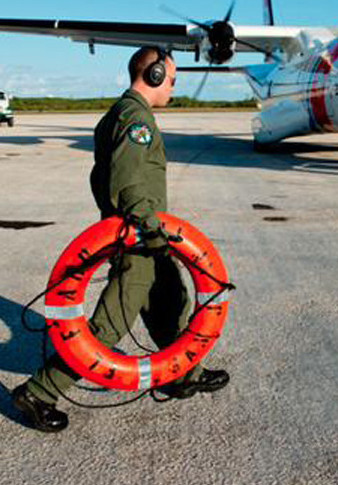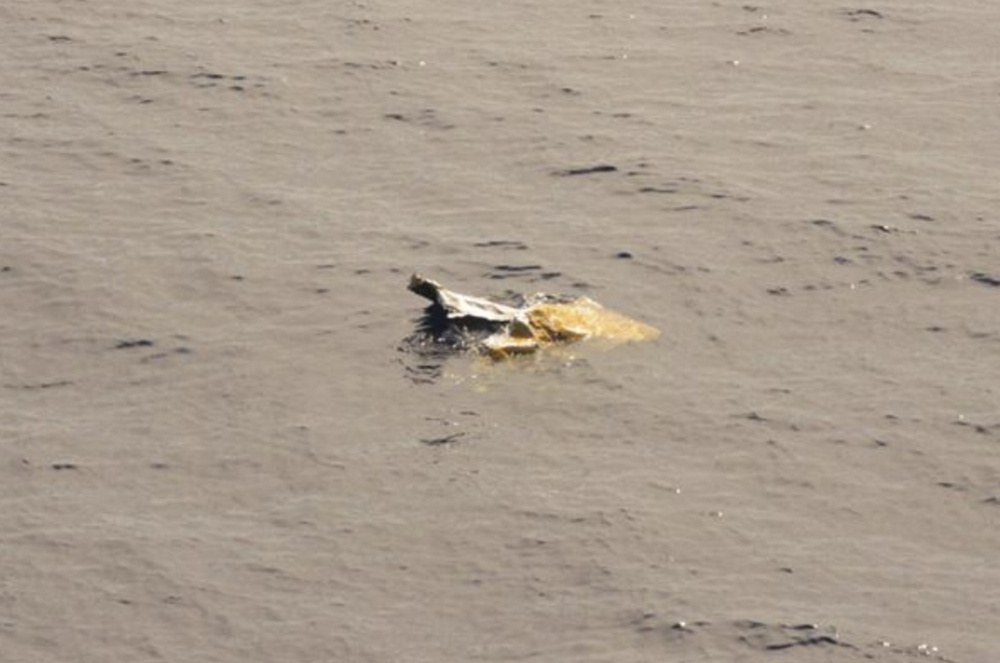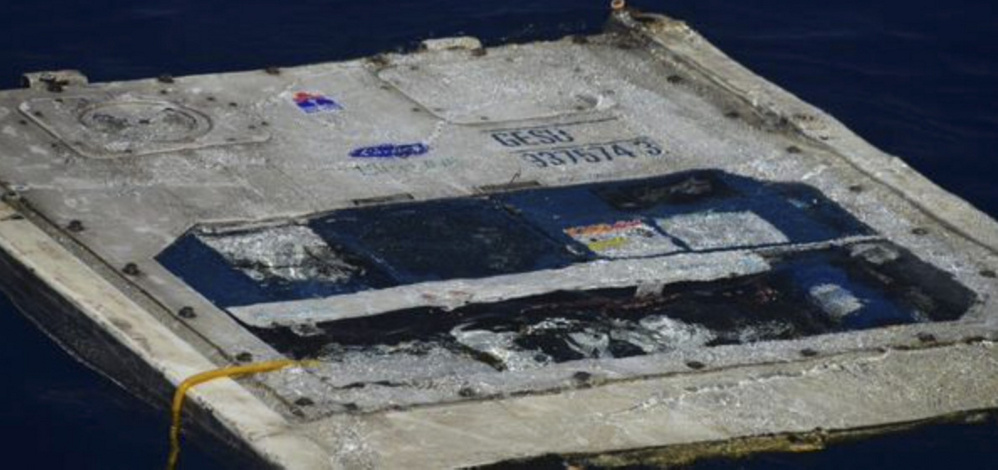The National Transportation Safety Board has taken over as the lead agency investigating the sinking of the cargo ship El Faro and says it will focus its efforts and resources on locating the ship and retrieving its voyage data recorder.
“Recovering the voyage data recorder is our first priority,” T. Bella Dinh-Zarr, the NTSB’s vice chairwoman, said at a news conference Tuesday night in Jacksonville, Florida.
Dinh-Zarr said the NTSB’s mission will be to develop a “factual” account of what happened to the ship, not only for the sake of the crew’s families, but for the American public.
She said the El Faro’s VDR, commonly referred to as the black box, stores data from the ship’s sensors and could provide investigators with a record of the ship’s movements and transmissions during the 12 hours before it sank.
Information such as a ship’s position and speed, audio from the bridge, ship alarms, hull openings and hull stress readings, wind speed and direction, and radio communications are just some of the data that can be stored in the black box.
Locating the ship, which the Coast Guard said sank near the Bahamas in 15,000 feet of water, will be challenging, but Dinh-Zarr said the VDR emits a “ping” or signal once it touches water. The device’s battery life is usually about 30 days, she said.
“No pinging has been heard, ” she said.
If the El Faro is found, the NTSB will then team up with the Coast Guard and the Navy to determine the best way to reach the vessel and recover the VDR.
Though Dinh-Zarr said there are “methods” available for such a deep-sea recovery, she declined to speculate on what those might involve.
In the meantime, she said the NTSB’s team of investigators will look at all facets of the ship’s engineering and navigation systems and its marine logs, and they will interview the ship’s owners. The team will remain in Florida for up to 10 days.
Dinh-Zarr said she met with the crew members’ families earlier in the evening Tuesday. She would not elaborate when asked how that meeting went.
“Our sole purpose is to figure out what happened and why it happened,” she said.
‘NO INTEREST IN NEGATIVE ENERGY’
Relatives of two Mainers feared lost at sea after the sinking said they are remaining positive about the search, and they aren’t second-guessing the decisions made by the ship’s captain.
“We have absolutely no interest in negative energy. We have no interest in looking at blame,” said Deb Roberts, the mother of Michael Holland, 25, of Wilton, one of 32 crew members who are still unaccounted for. “We have interest in finding my son and the rest of the crew alive, and the only thing I blame in this is Hurricane Joaquin.”
Laurie Bobillot, the mother of Danielle Randolph, 34, of Rockland, had no doubts about the abilities of Capt. Michael Davidson, 53, of Windham, who was piloting the 790-foot container ship when it lost power and was left stranded in the path of the gathering hurricane.
“I have all the faith in the world in the captain,” Bobillot said in an interview Tuesday morning with WCSH-TV in Jacksonville, where family members of the crew have gathered to await news of the search. “He’s been sailing for over 20 years now. He has a tough call, a real tough call to make, but I’m convinced he would not put his life or his crew’s life in unnecessary danger.”
When the El Faro left Jacksonville for Puerto Rico on Sept. 29, Joaquin had not yet been upgraded to hurricane status, and the decision whether to depart would have been Davidson’s.
But setting sail in tough conditions was not uncommon, Bobillot said.
“I’ve gotten so many emails from my daughter in the past, ‘Hey, we’re going into a tropical storm,’ or ‘Hey, the winds and the seas are really rough,’ or ‘Hey, Mom, we’re going for another rough ride,’ ” Bobillot said. “They have to do it or nothing would ever get delivered. The danger’s always there, and I have all the faith in the world the captain did what he thought was best.”
The search for survivors continued Tuesday off the coast of the Bahamas, where vessels and aircraft from the Coast Guard, Navy and Air Force scoured several debris fields consistent with the cargo ship’s contents.
“They’re finding things, but what we’re not finding are survivors,” Coast Guard spokesman Lt. Cmdr. Gabe Somma said in a phone interview Tuesday morning. “With every passing hour there is a heightened sense of urgency.”
Three Coast Guard cutters and multiple aircraft equipped with specialized search-and-rescue equipment are focusing on a roughly 300-square-mile expanse of ocean where rescue crews have spotted concentrations of debris from the sunken ship.
Rescuers haven’t seen signs of any of the ship’s crew since searchers spotted, but were unable to recover, the body of an unidentified crew member in a survival suit Sunday evening.
“We believe that they still could be alive,” Somma said.
RESCUE MISSION REMAINS ACTIVE
The ship’s crew members have strong ties to Maine.
Davidson, Randolph, Holland and a fourth crew member, Dylan Meklin, 23, all graduated from Maine Maritime Academy. Counselors at the school have been made available to students, and a vigil was held Tuesday evening at the Castine campus.
A full list of the crew members has not been released, and a spokesman for the ship owner said that every effort has been made to contact the family members of everyone on board. The company said 28 of the crew are American citizens and five are Polish nationals.
Tim Nolan, president of TOTE Maritime Puerto Rico, which owns the vessel, said in a statement Tuesday evening that the company is cooperating fully with the NTSB investigation, and will hire a third-party firm to perform an independent safety assessment of TOTE. Nolan said the company will release that assessment once it is complete.
The Coast Guard and TOTE will decide when to call off the rescue mission, said Mike Hanson, the TOTE spokesman.
In an earlier interview with The Associated Press, Phil Greene, the president and CEO of TOTE, the parent company, said Davidson conferred last week with the El Faro’s sister ship, which had returned from Puerto Rico to Jacksonville along a similar route, and he determined the weather was good enough for the El Faro to depart Jacksonville.
At the time of the El Faro’s departure, the storm had not been upgraded to hurricane status.
On board were 391 containers topside and 294 trailers and vehicles below deck. It was bound for San Juan, about 1,300 miles to the southeast, but ran into the hurricane less than halfway into the trip.
On the third day of the journey, the crew reported engine problems that left the vessel powerless to evade Hurricane Joaquin, a Category 4 storm that blew into the Caribbean region with winds that topped 130 mph, or maneuver once it was in the storm’s grasp.
“We do not know when his engine problems began to occur, nor the reasons for his engine problems,” Greene told AP.
‘AT THIS POINT … PRAYING FOR A MIRACLE’
The ship had more than enough lifeboats and rafts for its crew to escape the sinking vessel, but maritime experts say the high winds and 50-foot waves during Hurricane Joaquin would have made getting off the ship extremely difficult.
The ship had two lifeboats capable of carrying 43 people each, five life rafts and 46 water survival suits, according to the Coast Guard and the ship’s owner. One lifeboat has been found, badly damaged and empty.
The last known communication from the El Faro was received Thursday morning, when crew members made a satellite distress call about 35 nautical miles from Crooked Island to report that the ship had lost power.
Jordan Biscaro, a spokesman for the Seafarer’s International Union, said the union hall in Jacksonville has been the gathering place for families of crew members waiting for news of their loved ones.
Now, more than five days after the El Faro’s last communication, the feeling among the families has shifted, Biscaro said.
“From Sunday night on, I think the tone’s changed, and I think we understand that at this point we’re praying for a miracle,” Biscaro said.
Send questions/comments to the editors.








Success. Please wait for the page to reload. If the page does not reload within 5 seconds, please refresh the page.
Enter your email and password to access comments.
Hi, to comment on stories you must . This profile is in addition to your subscription and website login.
Already have a commenting profile? .
Invalid username/password.
Please check your email to confirm and complete your registration.
Only subscribers are eligible to post comments. Please subscribe or login first for digital access. Here’s why.
Use the form below to reset your password. When you've submitted your account email, we will send an email with a reset code.